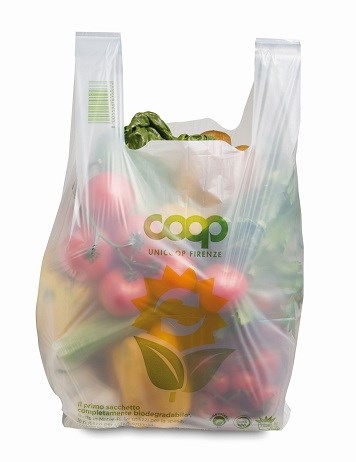France Supporting Biobased & Home-Compostable Bags
Single-use carrier plastic bags banned by new law in France.
France is one of the first European countries to take concrete measures on single-use carrier bags in favor of biobased and compostable bags in an effort to comply with the European Directive to reduce the consumption of lightweight plastic bags. Not only is it viewed as making strides on the environmental front but apparently will boost economic growth as the major portion of France’s single-use plastic bags for produce are imported.
Last August, France introduced a ban on single-use plastic bags as part of the new law on Energy Transition and Green Growth. Now, an implementation decree setting out the requirements and conditions in greater detail has been approved and goes into effect on July 1. The decree applies to single-use bags below a thickness of 50 microns, which will have to meet the requirements of the French standard for home composting and feature a biobased content of at least 30%. It also underpins the benefits of separate collection of organic waste with biodegradable and compostable bags.
Furthermore, the law calls for the biobased content to increase progressively to 40% in 2018, 50% in 2020, and 60% in 2025. Appropriate bioplastics materials have been readily available for quite some time, and manufacturers are said to be eagerly waiting in the wings. Said Christopher Doukhi-de Boissoudy, president of French association Club Bio-plastiques, “We welcome the mobilization of public authorities in order to finally achieve such a measure. It will allow biobased and biodegradable plastics stakeholders to harness the benefits that reduce our dependency on oil. The decree will help to reduce the plastic bags pollution as well as to revive economic activity for French plastics converters, as 90 percent of fruit and vegetable bags are currently being imported.”
The European Bioplastics (EUBP) association applauded the approval of the decree. Said Hasso von Pogrell, managing director for Berlin-based EUBP:
“This is an important measure and supports the efforts of EUBP to emphasize the essential role of bioplastics for the circular economy in Europe….We expect the French decree to serve as an example for European legislation and to contribute to the increased demand of sustainable bioplastic solutions.”
Search for nearly 100,000 grades of polymers on the Universal Selector by clicking here: http://www.ptonline.com/materials

Related Content
-
How to Extrusion Blow Mold PHA/PLA Blends
You need to pay attention to the inherent characteristics of biopolymers PHA/PLA materials when setting process parameters to realize better and more consistent outcomes.
-
NPE2024 Materials: Spotlight on Sustainability with Performance
Across the show, sustainability ruled in new materials technology, from polyolefins and engineering resins to biobased materials.
-
How to Optimize Injection Molding of PHA and PHA/PLA Blends
Here are processing guidelines aimed at both getting the PHA resin into the process without degrading it, and reducing residence time at melt temperatures.
















